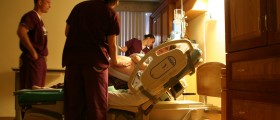
In people with Down syndrome there is usually an extra chromosome 21. However, this genetic condition can be a bit modified when not all cells contain the extra chromosome 21 and there is also translocation, another form of Down syndrome. Still, all of the mentioned are blamed for physical and mental impairments such patients experience right after birth or at some point in their lives.Down Syndrome and a Variety of Health Problems
Even though the outlook of people with Down syndrome is much better than it used to be, they are still susceptible to certain medical conditions and may be also born with certain defects.
Heart defects are in these patients congenital. While some heart defects are mild and require only medicamentous treatment, others are more complex and can be only corrected surgically. Right after birth, when the baby is confirmed to have Down syndrome, he or she is examined by a well experienced cardiologist who either confirms heart defects or rules out their presence.
Another problem these children face with immediately after birth is intestinal blockage. Most people with Down syndrome experience some kind of intestinal malformation that requires surgical correction.
Vision problems are also frequently reported. They occur in a form of crossed eyes (esotropia), nearsightedness, farsightedness and cataract. Vision impairments are easily dealt with eyeglasses and sometimes surgery.
Hearing loss is frequently reported among individuals who have Down syndrome. The reasons behind hearing loss are accumulation of fluid in the middle ear (repeated middle ear infections) and defects affecting the middle or the inner ear.
Conditions Down Syndrome Patients are Prone to
It is confirmed that Down syndrome patients are highly susceptible to colds, ear infections and many other infections comparing to healthy individuals. Even though these children also receive standard childhood immunization, infections are repeated and sometimes cause irreversible damage to certain organ systems.
Furthermore, congenital hyperthyroidism is a common medical issue such patients deal with. Hypothyroidism significantly interferes in growth and brain development and this is the reason why it must be identified on time and treated properly.
Unfortunately, people with Down syndrome are more prone to leukemia (cancer of white blood cells) than other people.
And finally, the incidence of Alzheimer's disease is much higher in people with Down syndrome than in general population. The reason why this occurs remains a mystery. Still, if a person shows signs of memory loss, personality changes and other such problems, he or she is highly likely to be suffering from this type of dementia.

















Your thoughts on this
Loading...